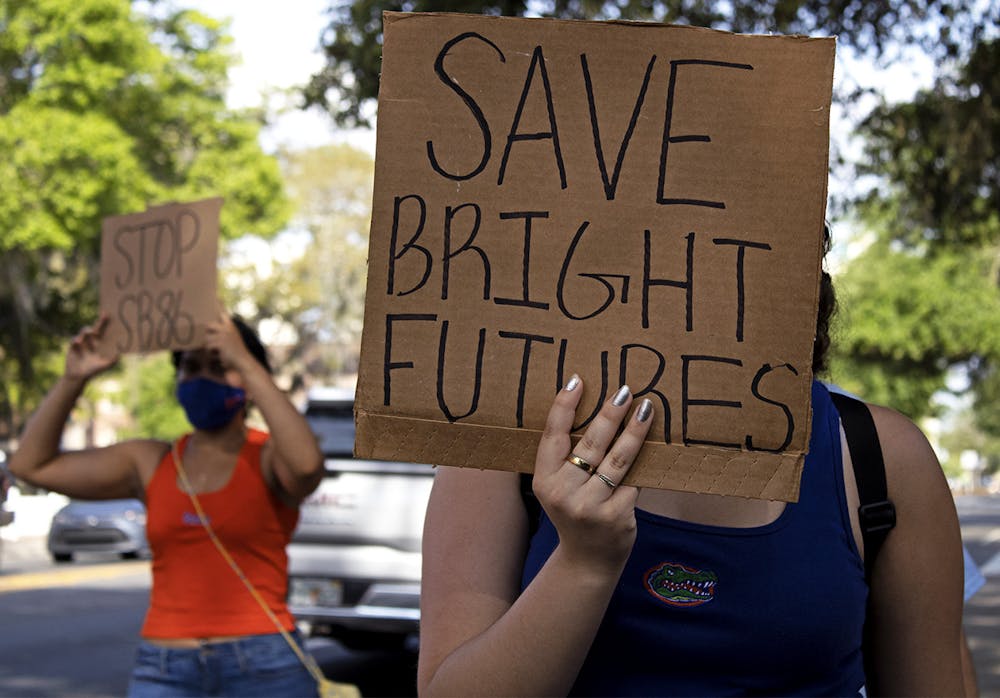After months of controversy, a bill proposing changes to Bright Futures funding was finally terminated when it stalled in the Florida House of Representatives. However, a change in the budget may still affect part of students’ Bright Futures funding.
The Florida Legislature’s 60-day session ended April 30 — and Senate Bill 86 alongside it.
Although the bill narrowly passed in the Senate April 8, it died on April 30 after being sent to the House to be considered, according to the bill tracker.
While students’ majors will not impact their scholarships for now, Bright Futures funding may still change. The Bright Futures Scholarship Program was founded in 1997 and is funded by the Florida Lottery.
Students qualifying for the highest scholarship award currently receive full tuition coverage from Bright Futures as well as an annual $600 stipend to cover textbooks and other academic expenses. These Florida Academic Scholars must earn at least a 1330 on the SAT, a 3.5 GPA and 100 service hours in high school, according to the Bright Futures Student Handbook.
On April 30, the House, with a 117 to 1 vote, and the Senate, with a 39 to 0 vote, agreed to eliminate the $600 stipend from the SB 2500 annual bill determining the year’s budget.
The funds provided by the approved budget go into effect July 1 until June 30, 2022.
Besides the loss of the stipend, no changes to the award amounts were made, Rep. Rene Plasencia, R-Orlando, said during the House session April 29. If Gov. Ron DeSantis signs the state budget into law, students will no longer receive the award added onto their Bright Futures tuition scholarship next year, Plasencia said.
Senate Bill 86, which was first filed in February by Sen. Dennis Baxley, R-Ocala, received major public backlash after its original version proposed students’ Bright Futures awards would be determined by their chosen major. To receive full credit hour funding, students needed to enroll in a program of study that would “lead directly to employment.” Their awarded amount would have also been reduced by the number of college credits they earned in high school.
Although Baxley advocated for uniting the world of work and the world of education, his own path was uncertain. Parents and students interpreted Baxley’s proposed bill as encouraging students to pursue STEM degrees. Despite this, Baxley received his own Bachelor of Arts in psychology and sociology at Florida State University in 1974 — majors speculated to be cut from Bright Futures funding.
Before the House failed to take up the bill, it underwent a number of changes in the Senate.
Following major opposition from students and parents across Florida, Baxley amended the bill two separate times.
The first time, Baxley added plans to create a public, online dashboard and included new requirements for the state university board of trustees to help students with career planning. The dashboard would have included data helping students and families make decisions about their education and future employment opportunities.
Baxley filed another amendment March 22, removing most of the bill’s controversial aspects. This change suggested a list of majors that “do not lead directly to employment” would still be created but would not have affected the amount awarded to students.
This version of the bill was not without its own controversy. It removed mention of specific tuition amounts guaranteed to students through Bright Futures.
Florida Academic Scholars receive 100% of their tuition, and 75% of tuition is covered for Florida Medallion Scholars. Instead, the bill was changed to say the awards would be “equal to the amount specified in the General Appropriations Act,” which decides the state’s budget each year.
With funding dependent on the state’s yearly budget, parents and students worried Bright Futures award amounts would no longer be guaranteed and could change year-to-year.
Piper Penney, an 18-year-old political science first year, said she was terrified when she first heard about the bill. Bright Futures was one of the main reasons why Penney chose to go to UF, and the scholarship allows her to be financially independent from her parents, she said.
Although senators made changes to the bill, Penney said it was concerning when they weren’t going to guarantee certain award amounts for students. Penney said the bill’s journey was a nerve-wracking process.
“Every time it kind of stopped for debate, I was like, ‘Is it going to die now?’” she said. “And it finally did at the very end.”
As a student who chose to stay in-state because of Bright Futures, Amanda Snyder said she felt frustrated by the bill. The 19-year-old UF biochemistry first year wanted to go to college out of state, but after looking at the price with her parents, she realized it would require taking out loans, she said.
Snyder said Bright Futures is good for the state of Florida because it keeps smart kids in state. Without the program, she said UF could lose some of its competitiveness.
“I think it helps the future of UF as a whole just because it’s going to keep the best and the brightest coming to UF, Florida State and other Florida schools,” she said.
Evan Smith, an 18-year-old UF political science first year, said the bill was another example of politicians in Tallahassee trying to take resources away from people who can’t afford a college education.
For Smith, Bright Futures means he can go to a state college and graduate without debt, he said.
“Bright Futures allows me to focus on being a student and not being a full-fledged adult,” Smith said. “Bright Futures let me focus on my education first and my finances second.”
When the bill stalled in the House, Smith said it was a sign student action and advocacy work.
“Because there was such broad criticism of this bill and such coordinated action against it, I felt really really accomplished as a student and as an activist when it ended up stalling in the House,” Smith said.
Contact Juliana Ferrie at jferrie@alligator.org. Follow her on Twitter @Juliana_F616 .

Juliana Ferrie is a second-year UF journalism student. She is excited to be working for The Alligator as the Santa Fe Beat reporter. In her free time, you can find her reading or listening to music.






